 |
★ ♥ ★ A Multicultural Community that unites people from all over the world ★ ♥ ★ |
 |
 |
Malcolm X |
 |

03-11-2007
|
 |
RHTDM
KALKI is offline
|
|
Join Date: Mar 2003
Location: I own a tent, it has a hole in it.
Posts: 47,407
Country: 
|
My Mood:

|
Malcolm X
Malcolm X
Malcolm X (born Malcolm Little; May 19, 1925 – February 21, 1965), also known as El-Hajj Malik El-Shabazz,was an American Black Muslim minister and a one-time spokesman for the Nation of Islam.
After leaving the Nation of Islam in 1964, he went on a pilgrimage, the Hajj, to Mecca and became a Sunni Muslim; he also founded the Muslim Mosque, Inc. and the Organization of Afro-American Unity. Less than a year later, he was assassinated in Washington Heights on the first day of National Brotherhood Week.
Historian Robin D.G. Kelley wrote, "Malcolm X has been called many things: Pan-Africanist, father of Black Power, religious fanatic, closet conservative, incipient socialist, and a menace to society. The meaning of his public life — his politics and ideology — is contested in part because his entire body of work consists of a few dozen speeches and a collaborative autobiography whose veracity is challenged.... Malcolm has become a sort of tabula rasa, or blank slate, on which people of different positions can write their own interpretations of his politics and legacy. Chuck D of the rap group Public Enemy and Supreme Court Justice Clarence Thomas can both declare Malcolm X their hero."
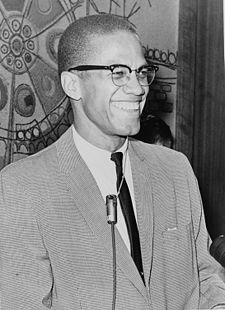
Born May 19, 1925(1925-05-19)
North Omaha, Nebraska, U.S.
Died February 21, 1965 (aged 39)
New York, NY, U.S.



|
 |
Early years |
 |
 03-11-2007
03-11-2007
|
#2
|
|
RHTDM
KALKI is offline
Join Date: Mar 2003
Location: I own a tent, it has a hole in it.
Posts: 47,407
My Mood:

Country 
Star Sign:  |
Early years
Early years
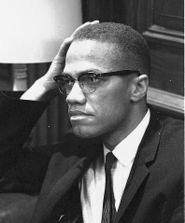
The young Malcolm XMalcolm Little was born in Omaha, Nebraska, to Earl Little and Louise Helen (née Norton). He lived briefly at 3448 Pinkney Street in the North Omaha neighborhood. His father was an outspoken Baptist lay speaker and supporter of Marcus Garvey, as well as a member of the Universal Negro Improvement Association.
According to Malcolm, three of Earl Little's brothers died violently at the hands of white men, and one of his uncles had been lynched.
Earl Little had three children (Ella, Mary, and Earl, Jr.) by a previous marriage before he married Malcolm's mother. From his second marriage he had eight children, of whom Malcolm was the fourth. (Earl and Louise Little's children's names were, in order, Wilfred, Hilda, Philbert, Malcolm, Reginald, Wesley, Yvonne, and Robert.)
Louise Little was born in Grenada and, according to Malcolm, she looked more like a white woman. Her father was a white man of whom Malcolm knew nothing except what he described as his mother's shame. Malcolm got his light complexion from him. Initially he felt it was a status symbol to be light-skinned but later he would say that he “hated every drop of that white rapist's blood that is in me.” As Malcolm was the lightest child in the family, he felt that his father favored him; however, his mother treated him harshly for the same reason.
One of his nicknames, "Red," derived from the reddish tinge of his hair. He was described as having, at birth, "ash-blonde hair ... tinged with cinnamon," and at four, "reddish-blonde hair." His hair darkened as he aged but resembled the hair of his paternal grandmother whose hair "turned reddish in the summer sun."
According to The Autobiography of Malcolm X, his mother had been threatened by Ku Klux Klansmen while she was pregnant with him in December 1924; his mother recalled that the family was warned to leave Omaha, because his father's involvement with UNIA was, according to the Klansmen, "stirring up trouble".
The family relocated to Milwaukee, Wisconsin, in 1926, and then to Lansing, Michigan, shortly thereafter. In 1931, Malcolm's father was found dead, having been run over by a streetcar in Lansing. Authorities ruled his death a suicide.[8] Malcolm claimed that this cause of death was disputed by the black community at the time, and he later disputed it himself, saying that his family had frequently found themselves the target of harassment by the Black Legion, a white supremacist group his father accused of burning down their home in 1929.
Malcolm wondered how his father could bash himself in the head and then lay down across street tracks to get run over.
Though Malcolm’s father had two life insurance policies, his mother received death benefits solely from the smaller policy. Malcolm claimed that insurance company that had issued the larger policy claimed that Earl Little's death had been a suicide, and accordingly refused to pay.[11] Louise Little had a nervous breakdown and was declared legally insane in December 1938. Malcolm and his siblings were split up and sent to different foster homes. Louise Little was formally committed to the state mental hospital at Kalamazoo, Michigan, and remained there until Malcolm and his brothers and sisters had her released 26 years later.
The Autobiography of Malcolm X states that, following the death of his father, Malcolm Little lived on Charles Street in downtown East Lansing. However, the 1930 U.S. Census (released in 2002) shows him living on a different Charles Street, in the low income Urbandale neighborhood in Lansing Township, between Lansing and East Lansing. Later, at the time he was in high school, he lived in Mason, an almost all-white small town 12 miles (19 km) to the south.
Quote:
|
Malcolm Little graduated from junior high school at the top of his class but dropped out soon after a teacher told him that his aspirations of being a lawyer were "no realistic goal for a nigger".
|
After enduring a series of foster homes, Malcolm was first sent to a detention center and then later moved to Boston to live with his older half-sister, Ella Little Collins. In Boston he held a variety of jobs and intermittently found employment with the New Haven Railroad. In 1942, Malcolm became "involved with Boston's underworld fringe."


|
|
|

|
 |
Young adult years |
 |
 03-11-2007
03-11-2007
|
#3
|
|
RHTDM
KALKI is offline
Join Date: Mar 2003
Location: I own a tent, it has a hole in it.
Posts: 47,407
My Mood:

Country 
Star Sign:  |
Young adult years
Young adult years
Malcolm left Boston to live for a short time in Michigan but soon moved to New York City in 1943. There he worked again for a short time for the New Haven Railroad. Malcolm found work as a shoeshiner at a Lindy Hop nightclub; in The Autobiography of Malcolm X, he says that he once shined the shoes of Duke Ellington and other notable African-American musicians. After some time in Harlem, he became involved in drug dealing, gambling, racketeering, robbery and prostituting himself.During this time, he was known to his friends and acquaintances as "Detroit Red".
Between 1943 and 1946, when he was arrested and jailed in Massachusetts, Malcolm drifted between Boston and New York City three more times.
When Malcolm was examined for the draft, military physicians classified him to be "mentally disqualified for military service." He explained in his autobiography that he put on a display to avoid the draft by telling the examining officer that he could not wait to organize with other black soldiers so he could "kill some crackers." His approach worked, and he was given a classification that ensured he would not be drafted.
In early 1946, Malcolm returned to Boston. On January 12, he was arrested for burglary after trying to steal back a stolen watch he had left for repairs at a jewelry shop. Two days later, Malcolm was indicted once again for carrying firearms. On January 16, he was charged with Grand Larceny and Breaking and Entering. Malcolm was sentenced to eight to ten years in Massachusetts State Prison.
On February 27, Malcolm began serving his sentence at the Massachusetts State Prison in Charlestown. While in prison, Malcolm earned the nickname of "Satan" for his vitriolic hatred towards the Bible, God and religion in general.
Malcolm began reading books from the prison library. Soon he developed first a voracious appetite for reading, then astigmatism. During this time, he received correspondence from his brother Reginald telling him about the Nation of Islam, to which Malcolm subsequently converted. For the remainder of his incarceration, he maintained regular contact with Elijah Muhammad, the group's leader.
According to the Autobiography, Malcolm started to gain fame among prisoners but also remained under the keen eye of the authorities, who recognized in him a force that could potentially foment trouble and who did not grant him the expected early release after five years.
In February 1948, mostly through his sister's efforts, Malcolm was transferred to an experimental prison in Norfolk, Massachusetts, that had a much larger library. Malcolm later reflected on his time in prison: "Months passed without my even thinking about being imprisoned. In fact, up to then, I had never been so truly free in my life." On August 7, 1952, Malcolm received parole and was released from prison.
Marriage
In 1958, Malcolm married Betty X (née Sanders) in Lansing, Michigan. They had six daughters together, all of whom carried the surname of Shabazz. Their names were Attallah (also spelled Attillah), born in 1958; Qubilah, born in 1960; Ilyasah, born in 1962; Gamilah (also spelled Gumilah), born in 1964; and twins, Malaak and Malikah, born after Malcolm's death in 1965.


|
|
|

|
 |
Nation of Islam |
 |
 03-11-2007
03-11-2007
|
#4
|
|
RHTDM
KALKI is offline
Join Date: Mar 2003
Location: I own a tent, it has a hole in it.
Posts: 47,407
My Mood:

Country 
Star Sign:  |
Nation of Islam
Nation of Islam
In 1952, after his release from prison, Malcolm went to meet Elijah Muhammad in Chicago. It was soon after this that he changed his surname to "X". Malcolm explained the name by saying, The "X" is meant to symbolize the rejection of "slave names" and the absence of an inherited African name to take its place. The "X" is also the brand that many slaves received on their upper arm. This rationale led many members of the Nation of Islam to change their surnames to X.
In March 1953, the FBI opened a file on Malcolm, supposedly in response to an allegation that he had described himself as a Communist. Included in the file were two letters wherein Malcolm used the alias "Malachi Shabazz". In Message to the Blackman in America, Elijah Muhammad explained the name Shabazz as belonging to descendants of an "Asian Black nation".
In May 1953, the FBI concluded that Malcolm X had an "asocial personality with paranoid trends (pre-psychotic paranoid schizophrenia)", and had, in fact, sought treatment for his disorder. This was further supported by a letter intercepted by the FBI, dated June 29, 1950. The letter said, in reference to his 4-F classification and rejection by the military, "Everyone has always said ... Malcolm is crazy, so it isn't hard to convince people that I am."
Later that year, Malcolm left his half-sister Ella in Boston to stay with Elijah Muhammad in Chicago. He soon returned to Boston and became the minister of the Nation of Islam's Temple Number Eleven. In 1954, Malcolm was selected to lead the Nation of Islam's Temple #7 on Lenox Avenue in Harlem, and he rapidly expanded its membership.
He became known to a wider audience after a local television broadcast in New York City about the Nation of Islam. After that, Malcolm was frequently sought after for quotations by the print media, radio, and television programs from the U.S. and, later, around the world. In the years between his adoption of the Nation of Islam in 1952 and his split with the organization in 1964, he espoused the Nation's teachings, including referring to whites as "devils" who had been created in a misguided breeding program by a black scientist, and predicting the inevitable (and imminent) return of blacks to their natural place at the top of the social order.
Malcolm was soon seen as the second most influential leader of the movement, after Elijah Muhammad. He opened additional temples, including one in Philadelphia, and was largely credited with increasing membership in the NOI from 500 in 1952 to 30,000 in 1963. He inspired the boxer Cassius Clay to join the Nation of Islam and change his name to Muhammad Ali. (Like Malcolm X, Ali later left the NOI and joined mainstream Islam.)
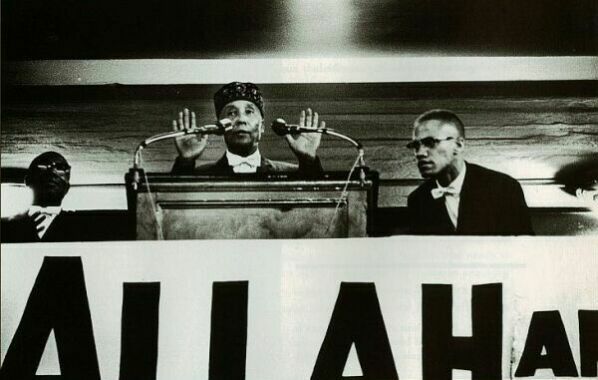


|
|
|

|
 |
Tensions and departure from the Nation of Islam |
 |
 03-11-2007
03-11-2007
|
#5
|
|
RHTDM
KALKI is offline
Join Date: Mar 2003
Location: I own a tent, it has a hole in it.
Posts: 47,407
My Mood:

Country 
Star Sign:  |
Tensions and departure from the Nation of Islam
Tensions and departure from the Nation of Islam
In the spring of 1963, Malcolm started collaborating on The Autobiography of Malcolm X with Alex Haley. Malcolm would later, in the Autobiography, explain his break with Elijah Muhammad by saying that in the early 1960s, he had begun to hear rumors of Elijah Muhammad's extramarital affairs with young secretaries. Adultery is condemned in the teachings of the Nation of Islam. At first, he claimed, Malcolm brushed these rumors aside.
Later, he spoke with Elijah Muhammad's son and the women making the accusations and believed them. In 1963, according to the Autobiography, Elijah Muhammad confirmed to Malcolm that the rumors were true and claimed that this activity was undertaken to follow a pattern established by Biblical prophets.
Malcolm viewed the March on Washington critically, unable to understand why black people were excited over a demonstration "run by whites in front of a statue of a president who has been dead for a hundred years and who didn't like us when he was alive." When asked to comment upon the assassination of John F. Kennedy, he replied that it was a case of "chickens coming home to roost," and added that "Chickens coming home to roost never made me sad. It only made me glad."
This comment led to widespread public outcry and led to the Nation of Islam's publicly censuring their former shining star. Although retaining his post and rank as minister, Malcolm was banned from public speaking for 90 days by Elijah Muhammad.
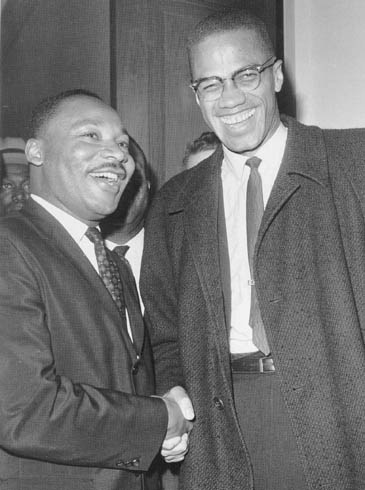
Martin Luther King, Jr. and Malcolm X, March 26, 1964
Malcolm publicly announced his break from the Nation of Islam on March 8, 1964, and founded the Muslim Mosque, Inc. four days later. Malcolm mostly adhered to the teachings of the Nation of Islam but began modifying them, explicitly advocating political and economic black nationalism as opposed to the NOI's religious nationalism.
In April, he made a speech titled "The Ballot or the Bullet." Malcolm was in contact with several orthodox Muslims, who encouraged him to learn about orthodox Islam. He soon converted to orthodox Islam, and as a result decided to make his pilgrimage to Mecca.


|
|
|

|
 |
Pilgrimage to Mecca |
 |
 03-11-2007
03-11-2007
|
#6
|
|
RHTDM
KALKI is offline
Join Date: Mar 2003
Location: I own a tent, it has a hole in it.
Posts: 47,407
My Mood:

Country 
Star Sign:  |
Pilgrimage to Mecca
Pilgrimage to Mecca
On April 13, 1964, Malcolm departed JFK Airport, New York for Cairo by way of Frankfurt. It was the second time Malcolm had been to Africa. On the next leg of his journey, Malcolm left Cairo for Jeddah, Saudi Arabia. His status as an authentic Muslim was questioned by Saudi authorities because of his inability to speak Arabic and his United States passport. Since only confessing Muslims are allowed into Mecca, he was separated from the group with which he arrived and was isolated. He spent about 20 hours wearing the ihram, a two-piece garment comprising two white unhemmed sheets.
According to the Autobiography, it was at this time he remembered the book The Eternal Message of Muhammad by Abdul Rahman Hassan Azzam and which Dr. Mahmoud Yousseff Sharwabi had presented to him with his visa approval. He called Azzam's son who arranged for his release. At the younger Azzam's home he met Azzam Pasha who gave Malcolm his suite at the Jeddah Palace Hotel. The next morning, Muhammad Faisal, the son of Prince Faisal, visited and informed him that he was to be a state guest. The deputy chief of protocol accompanied Malcolm to the Hajj Court. He was then allowed to make his pilgrimage.
On April 19, Malcolm completed the Umrah, making the seven circuits around the Kaaba, drinking from the Zamzam Well and running between the hills of Safah and Marwah seven times. According to the Autobiography, on this trip Malcolm viewed Muslims of different races interacting as equals and came to believe that Islam conceivably could erase all racial problems.


|
|
|

|
 |
Africa |
 |
 03-11-2007
03-11-2007
|
#7
|
|
RHTDM
KALKI is offline
Join Date: Mar 2003
Location: I own a tent, it has a hole in it.
Posts: 47,407
My Mood:

Country 
Star Sign:  |
Africa
Africa
Malcolm X visited Africa on three separate occasions, once in 1959 and twice in 1964. During his visits, he met officials, as well as spoke on television and radio in: Cairo, Egypt; Addis Ababa, Ethiopia; Dar Es Salaam, Tanganyika (now Tanzania); Lagos and Ibadan, Nigeria; Accra, Winneba, and Legon, Ghana; Conakry, Guinea; Algiers, Algeria; and Casablanca, Morocco.
Malcolm first went to Africa in summer of 1959. He traveled to Egypt (United Arab Republic), Sudan, Nigeria and Ghana to arrange a tour for Elijah Muhammad, which occurred in December 1959. The first of Malcolm's two trips to Africa in 1964 lasted from April 13 until May 21. On May 8, following his speech at Trenchard Hall on the campus of the University of Ibadan in Nigeria, he attended a reception in the Students' Union Hall held for him by the Muslim Students' Society. During this reception the students bestowed upon him the name "Omowale", meaning "the son returns home" in the Yoruba language.
Malcolm returned to New York from Africa via Paris on May 21, 1964. On July 9, he again left the U.S. for Africa, spending a total of 18 weeks abroad. On July 17, 1964, Malcolm addressed the Organization of African Unity's first ordinary assembly of heads of state and governments in Cairo as a representative of the OAAU.
On August 21, 1964, he made a press statement on behalf of the OAAU regarding the second African summit conference of the OAU. In it, he explained how a strong and independent "United States of Africa" is a victory for the awakening of African Americans. By the time he returned to the United States on November 24, 1964, Malcolm had established an international connection between Africans on the continent and those in the diaspora.
Malcolm held to the view that African-Americans were right in defending themselves from aggressors. On June 28, 1964, at the founding rally of the OAAU he said,
Quote:
|
"The time for you and me to allow ourselves to be brutalized nonviolently has passed. Be nonviolent only with those who are nonviolent to you. And when you can bring me a nonviolent racist, bring me a nonviolent segregationist, then I'll get nonviolent. But don't teach me to be nonviolent until you teach some of those crackers to be nonviolent."
|
In an interview with Gordon Parks in 1965, Malcolm revealed:
Quote:
"I realized racism isn't just a black and white problem. It's brought bloodbaths to about every nation on earth at one time or another. Brother, remember the time that white college girl came into the restaurant — the one who wanted to help the Muslims and the whites get together — and I told her there wasn't a ghost of a chance and she went away crying? Well, I've lived to regret that incident. In many parts of the African continent I saw white students helping black people. Something like this kills a lot of argument.
I did many things as a [black] Muslim that I'm sorry for now. I was a zombie then — like all [black] Muslims — I was hypnotized, pointed in a certain direction and told to march. Well, I guess a man's entitled to make a fool of himself if he's ready to pay the cost. It cost me 12 years. That was a bad scene, brother. The sickness and madness of those days — I'm glad to be free of them."
|


|
|
|

|
 |
France and the UK |
 |
 03-11-2007
03-11-2007
|
#8
|
|
RHTDM
KALKI is offline
Join Date: Mar 2003
Location: I own a tent, it has a hole in it.
Posts: 47,407
My Mood:

Country 
Star Sign:  |
France and the UK
France and the UK
In late 1964, Malcolm visited France together with Jamaican officials and spoke in Paris at Salle Pleyel where there were discussions and debates on the subject of the Rastafarian ideas espoused by both the Jamaicans present and Malcolm X at that time. He also visited the UK and participated in a debate at the Oxford Union on December 3, 1964.
On February 12, 1965, Malcolm visited Smethwick, near Birmingham, which had become a byword for racial division after the 1964 general election when the Conservative Party won the parliamentary seat using the slogan, among others,
Quote:
|
"If you want a nigger for your neighbour, vote Labour".
|
He visited a pub with a "non-coloured" policy and visited a street where the local council would buy houses and sell them to white families, to avoid black families moving in.


|
|
|

|
 |
Assassination |
 |
 03-11-2007
03-11-2007
|
#9
|
|
RHTDM
KALKI is offline
Join Date: Mar 2003
Location: I own a tent, it has a hole in it.
Posts: 47,407
My Mood:

Country 
Star Sign:  |
Assassination
Assassination
Tensions increased between Malcolm and the Nation of Islam. It was alleged that orders were given by leaders of the Nation of Islam to "destroy" Malcolm; in The Autobiography of Malcolm X, he says that as early as 1963, a member of the Seventh Temple confessed to him having received orders from the Nation of Islam to kill him.
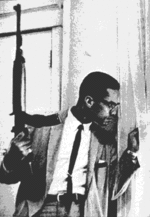
On March 20, 1964, Life published a photograph of Malcolm holding an M1 Carbine and pulling back the curtains to peer out of the window of his family's home. The photo was taken in connection with Malcolm's declaration that he would defend himself from the daily death threats which he and his family were receiving. Undercover FBI informants warned officials that he had been marked for assassination.
In June 1964, the NOI sued to reclaim Malcolm's home in Queens, which they claimed belonged to the organization. The suit was successful, and Malcolm and his family were ordered to vacate the house. On February 14, 1965, the night before a scheduled hearing to postpone the eviction date, the house burned to the ground. Malcolm and his family survived, and no one was charged with any crime.
On February 21, 1965 in Manhattan's Audubon Ballroom, Malcolm had just begun delivering a speech when a disturbance broke out in the crowd of 400.
A man yelled, "Get your hand outta my pocket! Don't be messin' with my pockets!" As Malcolm and his bodyguards moved to quiet the disturbance, a man rushed forward and shot Malcolm in the chest with a sawed-off shotgun. Two other men charged the stage and fired handguns at Malcolm, who was shot 16 times. Angry onlookers in the crowd caught and beat the assassins as they attempted to flee the ballroom. Malcolm was pronounced dead on arrival at New York's Columbia Presbyterian Hospital.
Two suspects were named by witnesses — Norman 3X Butler and Thomas 15X Johnson, both members of the Nation of Islam.
Three men were eventually charged in the case. Talmadge Hayer, also a Black Muslim, confessed to having fired shots into Malcolm's body, but he testified that Butler and Johnson were not present and were not involved in the shooting. All three were convicted.
Funeral
Malcolm's funeral was held in Harlem on February 27, 1965, at the Faith Temple Church of God in Christ, with 1,500 people attending. Ossie Davis delivered a eulogy, describing Malcolm as "our shining black prince."
There are those who will consider it their duty, as friends of the Negro people, to tell us to revile him, to flee, even from the presence of his memory, to save ourselves by writing him out of the history of our turbulent times. Many will ask what Harlem finds to honor in this stormy, controversial and bold young captain — and we will smile.
Many will say turn away — away from this man, for he is not a man but a demon, a monster, a subverter and an enemy of the black man — and we will smile. They will say that he is of hate — a fanatic, a racist — who can only bring evil to the cause for which you struggle! And we will answer and say to them: Did you ever talk to Brother Malcolm? Did you ever touch him, or have him smile at you? Did you ever really listen to him? Did he ever do a mean thing? Was he ever himself associated with violence or any public disturbance? For if you did you would know him. And if you knew him you would know why we must honor him.
Malcolm X was buried at the Ferncliff Cemetery in Hartsdale, New York. At the gravesite after the ceremony, friends took the shovels away from the waiting gravediggers and buried Malcolm themselves. Later that month, actors Ruby Dee and Sidney Poitier became co-chairs of the New York affiliate of the Educational Fund for the Children of Malcolm X Shabazz.
Response to Malcolm's death
After Malcolm's death, Martin Luther King, Jr., sent a telegram to Betty Shabazz, expressing his sadness over "the shocking and tragic assassination of your husband."
While we did not always see eye to eye on methods to solve the race problem, I always had a deep affection for Malcolm and felt that he had a great ability to put his finger on the existence and the root of the problem. He was an eloquent spokesman for his point of view and no one can honestly doubt that Malcolm had a great concern for the problems we face as a race.
Elijah Muhammad reacted differently; as he told the annual Savior's Day convention on February 26, "Malcolm X got just what he preached."
The international press, particularly that of Africa, was sympathetic. The Daily Times of Nigeria wrote, "Like all mortals, Malcolm X was not without his faults ... but that he was a dedicated and consistent disciple of the movement for the emancipation of his brethren no one can doubt. ... Malcolm X has fought and died for what he believed to be right. He will have a place in the palace of martyrs."
Kwangming, published in Beijing, bluntly stated that "Malcolm was murdered because he fought for freedom and equal rights."
Conspiracy theories
Within days of Malcolm's assassination, questions were raised about who was responsible for his death. On February 23, James Farmer, the leader of the Congress of Racial Equality, announced at a news conference that local drug dealers, and not the Black Muslims, were to blame.
Others blamed the police, the FBI, or the CIA, citing the lack of police protection and the ease with which the assassins had entered the Audubon Ballroom.
In the 1970s, the public learned about COINTELPRO and other secret government programs to infiltrate and disrupt civil rights organizations during the 1950s and 1960s. John Ali, national secretary of the Nation of Islam, has been identified as an FBI agent.
Malcolm had confided in a reporter that Ali had exacerbated tensions between him and Elijah Muhammad, and he considered Ali his "archenemy" within the Nation of Islam leadership.[29] On February 20, the night before the assassination, Ali met with Hayer, one of the men convicted of killing Malcolm.


|
|
|

|
 |
The film Malcolm X |
 |
 03-11-2007
03-11-2007
|
#10
|
|
RHTDM
KALKI is offline
Join Date: Mar 2003
Location: I own a tent, it has a hole in it.
Posts: 47,407
My Mood:

Country 
Star Sign:  |
The film Malcolm X
The film Malcolm X was released in 1992, directed by Spike Lee and based on the autobiography. It starred Denzel Washington as Malcolm, with Angela Bassett as Betty and Al Freeman, Jr. as Elijah Muhammad. Both Roger Ebert and Martin Scorsese named the film as one of the 10 best of the decade.


|
|
|

|
 Posting Rules
Posting Rules
|
You may not post new threads
You may not post replies
You may not post attachments
You may not edit your posts
HTML code is Off
|
|
|
All times are GMT +1. The time now is 06:43.
|